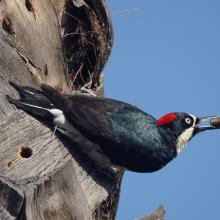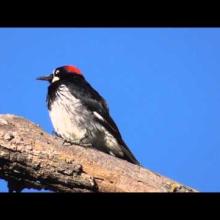

Join BirdNote tomorrow, November 30th!
Illustrator David Sibley and actor H. Jon Benjamin will face off in the bird illustration battle of the century during BirdNote's Year-end Celebration and Auction!
The Acorn Woodpecker is found in parts of the western US. It chips small recesses out of trees to fit the acorns it will harvest throughout the fall. A family of Acorn Woodpeckers may use this storage tree, or granary, for generations. Some of them hold as many as 50,000 acorns. So does the Acorn Woodpecker just kick back and munch acorns all winter? Nope! In the weeks after a fresh acorn is lodged in a hole, it dries and shrinks. So Acorn Woodpeckers spend much of the winter shuttling acorns from one hole to another, finding just the right fit.
Today’s show brought to you by the Bobolink Foundation.
Listen to this episode in Spanish here.
BirdNote®
Acorn Woodpeckers Create Granaries, One Acorn at a Time
Written by Bob Sundstrom
This is BirdNote.
[Acorn Woodpecker calling, http://macaulaylibrary.org/audio/56900, 0.37-.41].
A large, dark woodpecker clings to the side of a tree. Its face is almost clown-like, boldly patterned in black and cream, with a red crown. And it’s holding something in its bill. Eyeing the tree with care, the woodpecker wedges the object into a shallow hole. A closer look reveals thousands of these small pockets in the bark, most neatly set with acorns.
We’re watching an Acorn Woodpecker, a bird found in parts of the western US. And it chips out these little recesses to fit the acorns it’ll harvest throughout the fall. [Acorn Woodpecker laugh-like call, http://macaulaylibrary.org/audio/45158, 0.18-.21]
A family of Acorn Woodpeckers may use this storage tree, or granary, for generations. Some of them hold as many as 50,000 acorns, which the woodpeckers rely on when insect prey and other foods are hard to come by. But if trees with thick bark are in short supply, utility poles, fence posts, or the sides of barns will serve the same purpose.
[Acorn Woodpecker laugh-like call, http://macaulaylibrary.org/audio/45158, 0.18-.21]
So does the Acorn Woodpecker just kick back and munch acorns all winter? Not a chance. Because in the weeks after a fresh acorn is lodged in a hole, it dries and shrinks. Meaning Acorn Woodpeckers spend much of the winter shuttling them from one hole to another, finding just the right fit.
Today’s show brought to you by the Bobolink Foundation.
For BirdNote, I’m Mary McCann.
###
Bird sounds provided by The Macaulay Library at the Cornell Lab of Ornithology, Ithaca, New York. Recorded by G. A. Keller [56900 & 45158] and B. McGuire [188273].
BirdNote’s theme music was composed and played by Nancy Rumbel and John Kessler.
Producer: John Kessler
Executive Producer: Sallie Bodie
© 2016 Tune In to Nature.org October 2016 / September 2019 / October 2022 Narrator: Mary McCann
ID# ACWO-02-2016-09-15 ACWO-02






